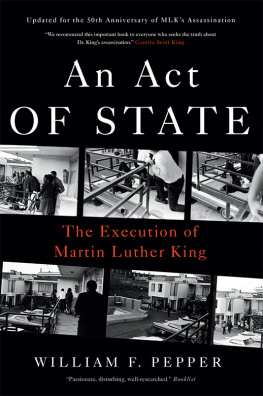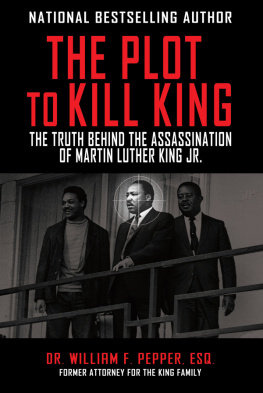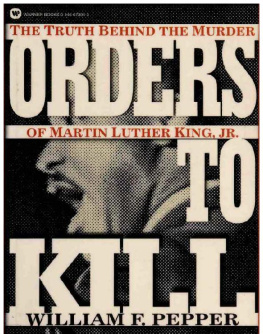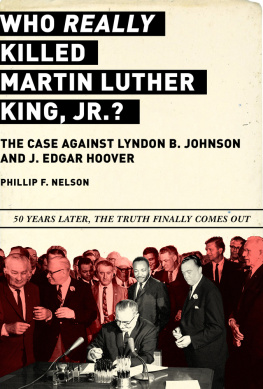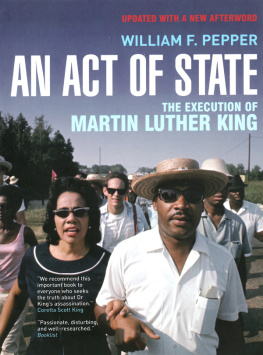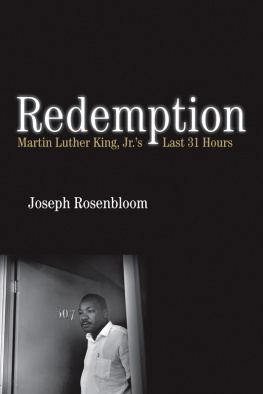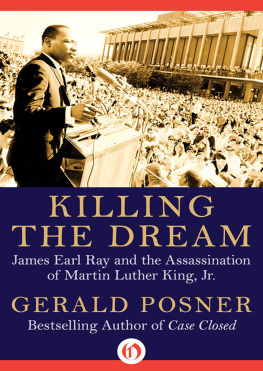WILLIAM F. PEPPER
William F. Pepper 2003, 2008, 2018
An Act of State recounts the 1999 civil trial which produced unprecedented evidence of the innocence of James Earl Ray and a jury verdict confirming that result. It also provided closure for the King family plaintiffs in the trial who I represented.
The thirty-day trial recorded evidence from seventy witnesses and aided the completion of what was, in the end, a forty-year investigation into the assassination of the American prophet who became my friend and colleague during the last year of his life. It also provided the foundation of my final book on the case, The Plot to Kill King (2016).
In the eighteen years after the civil trial we have learned how the assassination was organised through a close working relationship between J. Edgar Hoovers FBI, a Dixie Mafia family group, the Memphis Police Department, and state and local government officials.
They were determined to end Dr Kings opposition to the Vietnam War and prevent him from bringing half a million people to camp in protest in Washington, D.C.
With a patsy in place, they succeeded, but not as history has officially recorded.
Though struck by the assassins bullet, Dr King was taken, still alive, to the Emergency Room of Saint Josephs Hospital. As detailed in The Plot to Kill King, it was there that he was finally killed by the collaborating chief surgeon who placed a pillow over his face, causing death by suffocation, as witnessed by a surgical nurse who had been ordered to leave the room, and who saw the murder, over her shoulder, as she was going out of the door.
An Act of State laid the foundation for the ultimate revelation of this tragic event and loss in the history of the American Republic.
It provides an essential underpinning for the truth, which will likely continue to be denied and ignored by the American media.
Dr William F. Pepper, October 2017
In spring 1966, US carpet-bombing had systematically devastated ancient village-based rural culture in South Vietnam as napalm rained from the sky, slaughtering helpless peasants. As a freelance journalist, I had witnessed and chronicled these atrocities and in early 1967 opened my files to Dr Martin Luther King Jr, who had been awarded the Nobel Peace Prize two years earlier.
At this time when I discussed the effects of the war on the civilian population and the ancient village road culture of the Vietnamese people with Dr King, he was already inclined to formally announce his position on the war. He had previously voiced his growing concern about his countrys ever greater role in what appeared to be an internal struggle for control of the nation by a nationalist movement seeking to overcome an oligarchical regime in the south, which was previously beholden to western economic interests.
It occurs to me that he would likely react in much the same way today, opposing American, unilateral opposition to nationalist revolutionary movements around the world, which ostensibly is being mounted against terrorist organizations.
In the Museum of History in Hanoi is a plaque with the following words: All men are created equal. They are endowed by their creator with certain inalienable rights; among these are life, liberty and the pursuit of happiness. It was with these words and pro-American spirit, which Ho-Chi Minh said he took from the Declaration of Independence of the United States of America, that he proclaimed the Democratic Republic of Vietnam on 2 September 1945.
It was not lost on Martin that Ho-Chi Minhs reverence for Jefferson, Lincoln, and American democracy, as he idealized it, made him the legitimate father of a unified Vietnam. So, on April 4 1967, Martin declared his formal opposition to the increasing barbarities in Vietnam. By July 1967, against the disastrous backdrop of the Vietnam War, America began to burn not only through enemy attack but from racial tensions and riots sparked by mounting anger over living conditions at home.
At the Spring Mobilization anti-war demonstration in New York on April 15, before 250,000 cheering and chanting citizens, after I had advanced his name as an alternative presidential candidate to Lyndon Johnson, Dr King called on the government to stop the bombing.

